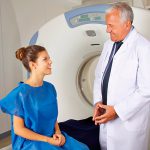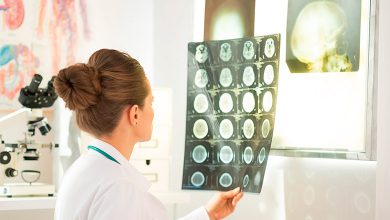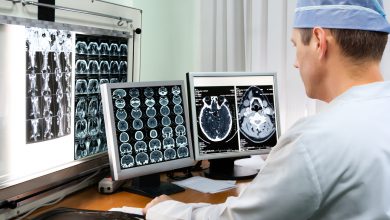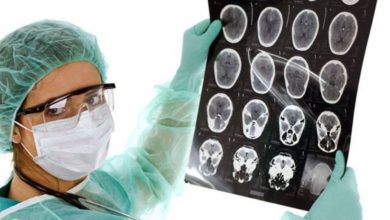Causes of brain cancer
The content of the article
Among the most serious and dangerous diseases is brain cancer, the causes of which are not fully understood by scientists. This disease is quite difficult to treat. The danger of the disease lies in its asymptomatic course, which entails the tumor growing into the last stage. Quite often, patients consult a doctor with symptoms that indicate other diseases. It is very important at this moment to conduct a competent diagnosis, which will allow timely detection of cancer.
Types of tumors in the brain
Brain oncology is not a common occurrence, but it carries a huge danger. Formations are not always deadly. Tumors are divided into two types:
- Benign tumors are removed surgically. This species is characterized by its small size and clear boundaries. Benign cancer cells do not have the ability to grow, which eliminates death. Possible complications in the form of a difficult-to-reach location. Despite the fact that the tumor is not life-threatening, it causes a number of negative consequences, such as high intracranial pressure.
- A malignant tumor poses a serious threat to human life. Cancer cells tend to grow rapidly and damage other healthy tissues. During the growth process, the tissues are completely damaged. Sometimes there are cases of point formation of tumors. It is limited to the bones of the skull, so metastases do not have the opportunity to affect healthy tissue.
Tumors that develop from the lining of the brain are called meningioma . A neoplasm formed directly in the brain tissue is called astrocytoma . Malignant formations affect the sheath of the cranial nerves, therefore they are called neuromas .
Causes of brain tumors
To protect yourself and your loved ones, it is important to know what causes brain cancer. To the question: why cancer occurs, scientists cannot give a comprehensive answer, but today a list of the most common factors that cause this disease has been compiled. The main causes of the formation of cancerous tumors are:
- Genetic predisposition. Brain oncology appears as a result of hereditary diseases, such as Li-Fraumeni and Gorlin syndromes, Bourneville disease, tuberculous sclerosis. Disturbances of the APC gene also cause the development of cancer.
- The main causes of brain cancer in women are bad habits, such as abuse of alcoholic beverages and nicotine products. Nicotine and alcohol cause cell mutation, which provokes the formation of malignant tumors.
- Radiation and carcinogenic substances are also responsible for the formation of tumors. People whose professional activities involve hazardous production and radioactive exposure, such as the chemical and nuclear industries, are automatically at risk.
- Even minor injuries can cause the development of cancer. Any intracranial damage or bruises negatively affect the functionality of the organ.
- Various pathologies provoke the formation of tumors of different types.
Numerous studies have shown that women and people with fair skin most often suffer from this disease. Most often, brain cancer occurs in adult patients. In children, this disease is much less common. The tumor is localized in the lining of the brain, affecting the pineal gland and pituitary gland. In children, the disease has a negative impact on the cerebellum and organ trunk. Brain cancer can also form in the presence of cancerous tumors in other organs of the body. Metastases penetrate the circulatory system, causing cancer cells to easily pass through the skull into the brain tissue.
Stages of brain cancer development
To determine therapeutic and surgical options, it is necessary to know how brain cancer develops. Brain cancer has the following stages of development:
- The first or initial stage poses the least threat. At this stage, the patient has a small number of malignant cells. The tumor at this stage is small and practically does not grow. The symptoms of this stage are practically not expressed; the patient may feel slightly unwell.
- The second stage is characterized by a noticeable increase in the tumor. A connection of infected tissues with other tissues of the organ is observed. The main symptom is low blood pressure.
- At the third stage, rapid growth of the tumor is observed. Cancer cells invade large areas of healthy tissue. The stage cannot be treated.
- The fourth stage is the most dangerous, as it leads to death. The tumor covers all previously healthy organ tissue.
Early symptoms of brain cancer
For timely detection of the disease, it is necessary to know how brain cancer manifests itself in the primary stages. The first thing you need to know is that signs of the disease can be single and appear almost imperceptibly. Regardless of location, cancer at an early stage has the same symptoms. They are focal and cerebral. The second type appears precisely in the first stages:
- Headaches occur naturally. The pain is pulsating in nature, which may result in clouding of consciousness or vomiting. Headaches most often occur in the morning and go away after some time.
- Dizziness may occur for no reason.
- A sharp decrease in body weight is a symptom of damage to healthy organ cells.
- Increased body temperature occurs due to a weakened immune system, which is affected by cancer cells.
- Fatigue and constant feeling of tiredness. The symptom occurs due to the release of waste products of cancer cells, which poison the entire body.
- When the vascular system is damaged, the patient develops anemia.
- At the beginning of the disease, constant nausea and vomiting in the morning may appear.
Focal symptoms depend on the location of the tumor and manifest themselves as:
- partial or complete impairment of mobility of certain parts of the body;
- changes in psycho-emotional state;
- disruption of the genitourinary system.
These symptoms may be a sign of other dangerous diseases. Therefore, if at least one of the symptoms appears, you should consult a doctor who will prescribe a series of diagnostic procedures.
Symptoms in later stages of development
It is important to know how brain cancer manifests itself in the later stages in order to take measures to improve the patient's condition. In later stages, the following symptoms appear:
- Deterioration or loss of vision. This symptom appears due to pressure of the tumor on the optic nerve. If no action is taken, the nerve dies. Under such conditions, it will be impossible to restore vision.
- If the tumor puts pressure on the auditory nerve, the patient can no longer hear.
- The development of epilepsy is a very dangerous symptom that appears suddenly in young people with a second stage tumor.
- Various hormonal disturbances are observed in patients with adenomatous tumor.
- When cancer cells invade the brain stem, breathing and swallowing problems occur. The function of smell is lost. These symptoms significantly worsen the patient's quality of life.
- A mass in the temporal lobe of the brain causes the patient to experience auditory and visual hallucinations.
- A tumor in the occipital region of the brain affects the perception of colors.
This symptomatology makes a person incapacitated and dependent. Therefore, you should not delay your visit to the doctor.
Brain cancer in children
Doctors have found that 16% of cancer patients are children. These tumors are called medullablastomas. This species rarely metastasizes, and symptoms manifest themselves in the pressure of the tumor on certain areas of the brain. The main sign of tumor development in children is considered to be an increase in head circumference, and in infants the fontanelle swells. In older children, there is a strong increase in intracranial pressure, resulting in divergence of the sutures of the skull. Basically, all the symptoms of brain cancer occur the same in adults and children. The problem is that a small child cannot explain his feelings. You can guess the problem by observing his behavior. As a rule, children become nervous, often cry, and constantly pull their hands to their head. Doctors can determine the disease by the child's fundus. During the examination, swelling and hemorrhages in the retinal area are visible. These symptoms are conditional and an accurate diagnosis can only be made after a series of diagnostic procedures.
Diagnosis of brain cancer
It is simply unrealistic to understand that you have brain cancer without a certain examination. If any symptom appears, it is necessary to undergo an examination, which will be prescribed by a doctor after collecting an anamnesis. Diagnosis of brain cancer includes:
- A thorough examination by a doctor to gather information about the patient's general condition. To do this, certain tests are examined to detect problems with coordination, tactile and motor function. The tendon reflex is also tested.
- Magnetic resonance imaging is prescribed when a deviation from the norm is detected. This diagnosis allows you to identify a tumor at any stage of development and determine its location.
- A puncture of brain tissue will determine the presence of cancer cells, the degree of tissue changes and the stage of the cancer process. This procedure cannot be performed if the tumor is in a hard-to-reach area.
- X-ray is necessary to determine the location of the tumor based on the blood vessels shown in the image.
- Craniography helps identify changes in bone structure and calcium deposits.
Based on the results obtained, the doctor determines the most appropriate treatment method, taking into account all the characteristics of the patient’s body and the course of the disease.
What treatments are there for brain cancer?
Therapy is possible in only three ways:
- surgical intervention;
- chemotherapy;
- radiation therapy.
Quite often, doctors prescribe combination therapy, which includes several treatment methods. Methods to combat brain cancer have a lot of features and nuances. For example, chemotherapy is an ineffective method and is used as an additional therapy. In most cases, surgical treatment is prescribed by removing the tumor. But sometimes this method cannot completely rid the patient of a tumor, since the tumor can be located in vital structures. In such cases, the tumor is partially removed, and the remaining part is treated with radiation.
Today, progress and development of new technologies allows operations to be performed without affecting vital areas with minimal injury to the patient. This category includes cyberknife and gamma knife.
The patient may also be prescribed cryosurgery. This method allows you to freeze the tumor using liquid nitrogen. This technique is quite effective when surgery is not possible.
Preventive measures
First of all, every person needs to attend lectures that tell what causes brain cancer and how to avoid becoming a victim of this disease. Information on this topic will help many people identify the disease in the early stages. Any preventive measures are aimed at eliminating risk factors.
To avoid brain cancer you need to:
- stop eating smoked meats;
- do not use tobacco products;
- limit your body from frequent exposure to cell phones;
- stop drinking alcohol and energy drinks;
- refuse to take products that contain carcinogens;
- Some studies have shown that certain types of vitamin supplements and dietary supplements can cause cancer.
The main preventive action is considered to be regular scheduled examination by a neurologist. In order to protect your body, doctors recommend:
- add more vegetables and fruits to your diet;
- it is necessary to lead a healthy lifestyle, regularly do physical activity;
- spend more time outdoors;
- organize the correct sleep schedule for the full production of melatonin;
- limit yourself from frequent stressful situations.
It is very important to support the immune system. Eating onions and garlic will help strengthen your immune system. Eating whole grain cereals has a positive effect on the immune system. In order for the body to always be healthy, it is necessary to rest more, eat right, strengthen the body and engage in physical activity.
To summarize, we can establish that brain cancer is one of the most dangerous diseases, which is difficult to treat and difficult to tolerate. Scientists are still trying to figure out what causes brain cancer. As a rule, the cause is heredity, poor nutrition , bad habits and professional activities. This disease manifests insidiousness in its asymptomatic course. Only a high-quality diagnosis will help you find out that you have brain cancer in the early stages. Today, the main diagnostic method is MRI with a contrast agent, which provides data on the location, size and stage of the tumor. The most effective methods are used for treatment, which are selected taking into account all the nuances and characteristics of the patient. Treating cancer takes a lot of time and effort. But if the disease is detected at the first stage, the chance of recovery increases.
Please rate the article:





